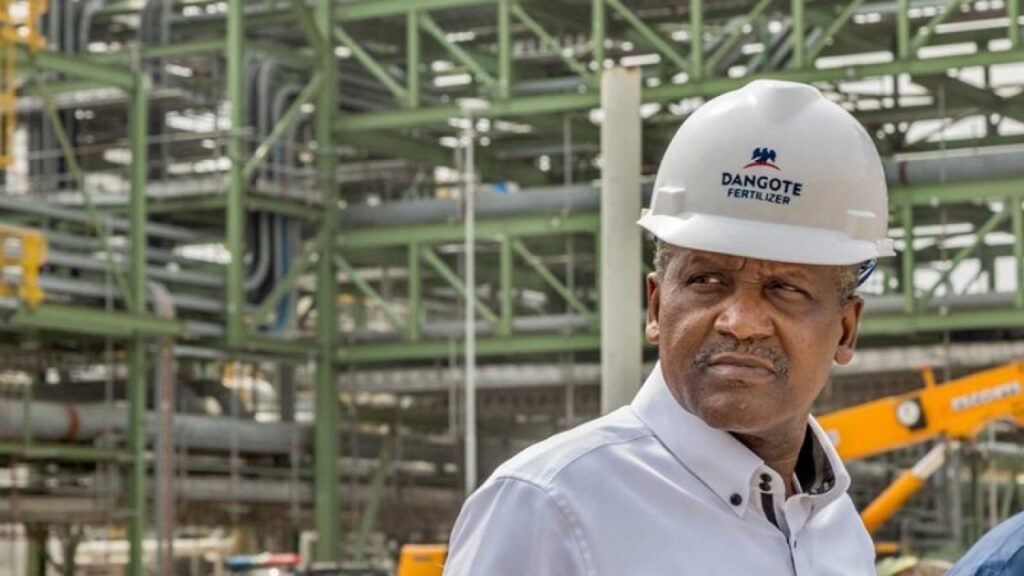- The construction took over 20 years and bears a processing capacity of 650,000 barrels per day 250,000 per day of gasoline and 100,000 of diesel.
- The Dangote oil refinery might halt the decades-long gasoline trade from Europe to Africa worth $17 billion each year.
Dangote Oil Refinery
Aliko Dangote, Nigeria’s and Africa’s wealthiest man ambition to foster energy reliance in his motherland and the region at large might be at risk. The giant oil refinery which is said to possess the potential to end decades-long gasoline trade from Europe to Africa worth $17 billion a year.
Concerns and tensions are high as a myriad of issues emerged before and since the $ 20 billion refinery came to life. According to various news reports, including the BBC and Reuters, the construction began in 2016 and started producing diesel and aviation fuel in January this year as petrol is expected to follow.
The construction took over 20 years and bears a processing capacity of 650,000 barrels per day and 250,000 per day of gasoline and 100,000 of diesel.
A report by Reuters indicate that, the refinery would produce oil for both local consumption and international trade. Already, 150,000 fuel stations run by the Independent Petroleum Marketers Association of Nigeria (IPMAN) have been sanctioned to receive fuel supplies from the newly built private Dangote refinery.
However, since January – when the refinery began production the refinery has processed around 8 million barrels of oil between January and February and according to a report by Reuters, it will take two months to reach full capacity.
On another note, Devakumar Edwin, Vice President of Dangote Group said the refinery will be producing 500,00 before the end of August, a higher number exceeding the nation’s 480,000 barrels per day usage, to export surplus, according to BBC.
Furthermore, the journey to the ambitious oil industry development has not been full of roses.
Dangote whose financial actions prove his patriotic act has seen a myriad of challenges left and right including critic from his wealthy friend.
“Four years ago, one of my very wealthy friends began to invest his money abroad. I disagreed with him and urged him to rethink his action in the interest of his country. He blamed his action on policy inconsistencies and shenanigans of interest groups. That friend has been taunting me in the past few days, saying he warned me and that he has been proven right,” the billionaire told Nigerian Newspaper.
However, Dangote selfish act to invest in his country and vision to starve Nigeria of its energy problems is banked on borrowed time.
“We have been facing a fuel crisis since the 70s. This refinery can help in resolving the problem, but it does appear some people are uncomfortable that I am in the picture. So, I am ready to let go, let the NNPC buy me out, run the Dangote oil refinery,” he said
READ: Nigeria Oil Production Significantly Falls In 3 Months
Refinery challenges
The organisation began looking at the prospect of securing crude from fellow African oil producer, Libya, as an alternative from buying from the USA and Brazil.
This is even though Nigeria is Africa’s largest oil producer. However, oil theft, pipeline vandalism, and low investment have hampered the West African country’s ability to fully maximize its oil sector.
Additionally, Nigeria’s Midstream and Downstream alleged that Dangote’s gasoil contains more Sulphur than the legal level of 200 parts per million (ppm).
Dangote, on the other hand, denied that the petroleum products produced by his refinery were of poor quality.
Competition and exportation
If all goes well, the refinery once it reaches its fullest capacity would be the largest in Europe and Africa. But the success of the latter is hinged on the company’s ability to handle the market issues.
Available data from refining industry body Concawe indicates at least 30 European refineries shut down since 2009, with nearly 90 plants of various sizes and complexities in operation.
Reuters pointed out the latter is triggered by competition from new and complex plants established in Middle East, Asia and more recently because of the impact of the COVID pandemic.
Since 2016, Europe has lost 1.52 million barrels per day of operational crude distillation which currently stands at 13.93 million bpd, consultancy IIR’s data shows.
Most of the decrease took place in 2021 and 2022 as demand destruction during the COVID-19 pandemic forced shutdowns.
European refineries don’t produce enough diesel to meet regional needs but produce too much gasoline and rely on exports to clear excess supply.
West Africa has long been the main outlet for gasoline that doesn’t meet stricter environmental restrictions in Europe on sulphur and metals content.
On the gasoline export front things are stiff. According to the Reuters report, that trade accounted for $17 billion in 2023, according to price data from Argus Media and Reuters calculations.
The Dangote refinery is configured to produce as much as 53 million litres of gasoline a day, about 300,000 bpd.The drop in West African imports will coincide with new environmental laws in Northwest Europe, that will force plants to reconfigure, seek new markets for lower-quality gasoline, or close down.
Plants that have funds to reconfigure could direct gasoline exports to the U.S. or South America, Kpler senior refining analyst Yaping Wang said. But upgrading refineries is also difficult because banks are wary of lending money to fossil fuel projects.
“Even if you find a bank which will fund a European refinery upgrade project, rates will be too high to make it work,” said an executive at a major U.S. bank which lends to oil companies.
READ: Can Nigeria oil and gas firms succeed where Shell faced setbacks?
Mixed feelings in the market
The wealthiest man in Africa could be facing doubts regarding his investment choice in the region’s competitive economy as challenges converge his new investments.
The refinery’s development has been considered the crucial moment in Nigeria’s drive for energy independence. Despite being the largest country by population and the top oil producer on the continent, Nigeria’s oil market has been plagued by an inability to refine its own oil, leaving it at the mercy of foreign markets.
The establishment of the Dangote oil refinery alongside the rehabilitation of dilapidated refineries in the country is expected to change its dependence.
“The loss of the West African market will be problematic for a small set of refineries that do not have the kit to upgrade their gasoline to European and U.S. specification,” consultancy FGE’s head of refined products Eugene Lindell said.
According to Kpler analyst Andon Pavlov, 300-400,000 bpd of European refining capacity is at risk of ceasing as global gasoline output rises.
Moreover, Reuters highlighted that a European refinery executive who declined to be identified stated that coastal refineries oriented for exports will be more susceptible, but interior refineries are less vulnerable since they rely on local demand.




